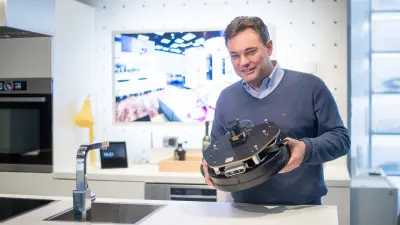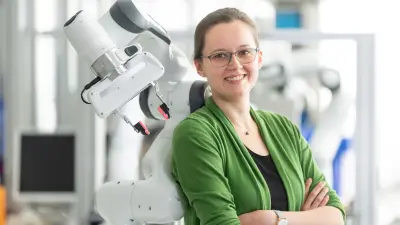Maja Rudolph
Senior research scientist in deep probabilistic modeling

Engineering devices typically rely on sensors to measure necessary inputs. Machine-learning methods trained on sensor data can increase the utility of such devices by improving their efficiency or enabling exciting new features. However, modeling sensor data presents a number of challenges — real-world data often exhibits multimodal dynamics; some sensors are usually sampled at irregular time intervals; and most industrial datasets are unlabeled. Learning from sensor data requires methods that are flexible enough to capture the underlying complexity while handling various types of noise and uncertainty. For this reason, the main technical theme in my research is how to best combine deep learning with probabilistic modeling.
Please tell us what fascinates you most about research.
My favorite aspect of research is that you have an opportunity to explore and learn new things every day.
What makes research done at Bosch so special?
Bosch Research is a special place, as experts from many different engineering domains collaborate with us at the Bosch Center for AI to develop innovative AI solutions for many different application areas. I am really fascinated by my colleagues’ wealth of engineering knowledge and am working on different ways to integrate their expertise into machine learning algorithms. We call this integrated approach hybrid modeling, and to drive this topic forward, I co-founded the hybrid modeling expert focus group.
What research topics are you currently working on at Bosch?
My research lies in the intersection of Bayesian machine learning and deep learning. Bayesian modeling helps communicate modeling choices and reason about uncertainty, while neural networks provide the flexibility to model complex interactions in the data.
What are the biggest scientific challenges in your field of research?
One challenge in modeling sensor data from industrial applications is that it is often impractical to label the data. If we want to learn to detect anomalies in an assembly line’s sensor data, for example, there are usually no labels. There is an area in machine learning called self-supervised learning, where a model is trained on tasks that do not require labels. These methods are particularly well explored for computer vision, but we have been working to extend self-supervised anomaly detection to domains beyond images, including time series and graph data.
How do the results of your research become part of solutions “Invented for life”?
We specifically work on machine-learning research questions derived from real-world engineering problems such as how to model driving behavior, how to forecast a device’s operating conditions, or how to find anomalies in an assembly line’s sensor data. Our machine learning solutions can make engineering systems safer and more efficient.
Curriculum vitae
Since 2018
Ph.D. Computer Science, Columbia University, Advisor: David Blei
2015
M.Sc. Electrical Engineering, Columbia University
2013
B.Sc. Mathematics, MIT

Selected publications

S. Löwe et al. (2022)
- Sindy Löwe, Phillip Lippe, Maja Rudolph, Max Welling
- Transactions on Machine Learning Research (TMLR)

C. Qiu et al. (2022)
- Chen Qiu, Marius Kloft, Stephan Mandt, Maja Rudolph
- International Joint Conference on Artificial Intelligence

C. Qiu et al. (2022)
- Chen Qiu, Aodong Li, Marius Kloft, Maja Rudolph, Stephan Mandt
- Proceedings of the 39th International Conference on Machine Learning, PMLR 162:18153-18167

M. Schirmer et al. (2022)
- Mona Schirmer, Mazin Eltayeb, Stefan Lessmann, Maja Rudolph
- Proceedings of the 39th International Conference on Machine Learning, PMLR 162:19388-19405
Get in touch with me
Maja Rudolph
Senior research scientist in deep probabilistic modeling


